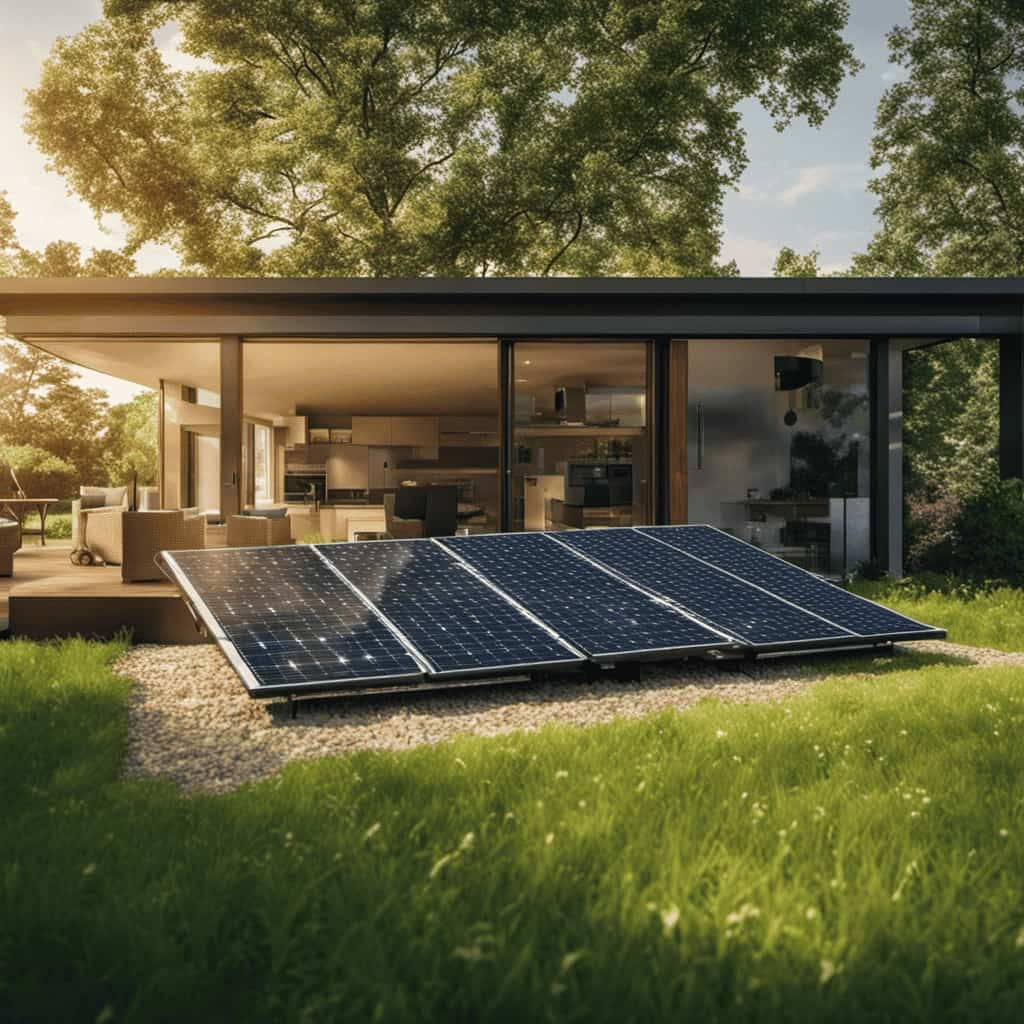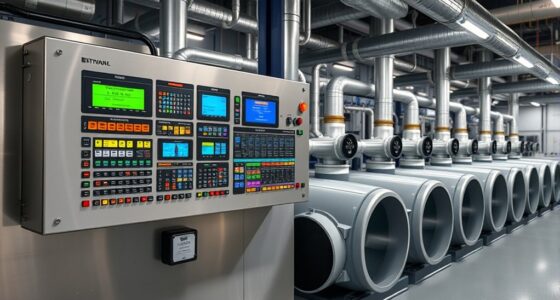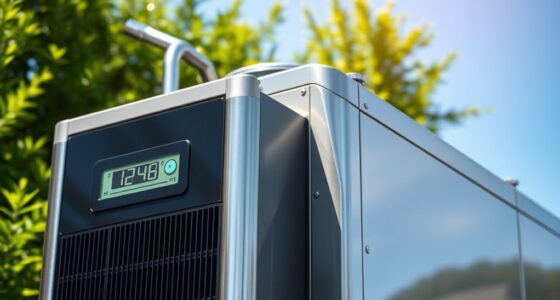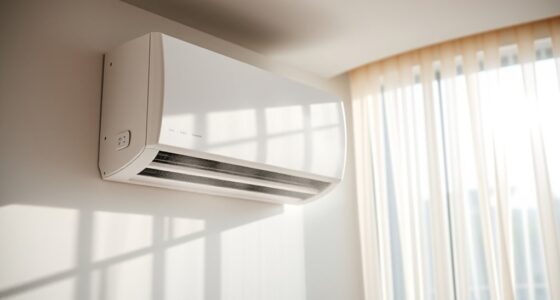Interested in understanding why your HVAC system’s heat pump failed? You’re in the right place, as we have the answers you’re looking for.
In this article, we’ll explore the common causes of heat pump failure, such as lack of maintenance, electrical issues, refrigerant leaks, thermostat problems, and more.
So, buckle up and get ready to dive into the technical world of HVAC systems, where we’ll unravel the mysteries behind heat pump failures.
Let’s get started!

Key Takeaways
- Regular maintenance and cleaning are crucial for optimal performance and longevity of the heat pump.
- Electrical issues and component failures can lead to reduced airflow, strain on the system, and potential system failures.
- Refrigerant leaks and low levels can cause heat pump failure, reduced cooling or heating capacity, and increased energy consumption.
- Thermostat problems and malfunctions can result in discomfort, inefficient energy usage, and potential damage to the heat pump.
Common Causes of Heat Pump Failure
One common cause of heat pump failure is a lack of regular maintenance.
Heat pump maintenance is crucial for ensuring optimal performance and longevity of the system. Regular maintenance includes tasks such as cleaning or replacing air filters, inspecting and cleaning coils, checking refrigerant levels, and lubricating moving parts. Neglecting these maintenance tasks can lead to various issues, such as reduced efficiency, increased energy consumption, and even complete system failure.
To prevent such problems, it’s important to follow a regular maintenance schedule and perform necessary troubleshooting. This includes checking for any unusual noises, monitoring temperature differentials, and inspecting for leaks or blockages. By addressing maintenance needs promptly, homeowners can avoid costly repairs and prolong the lifespan of their heat pump.
Now, let’s delve into the signs and symptoms of a failing heat pump.

Signs and Symptoms of a Failing Heat Pump
We will now discuss the signs and symptoms of a failing heat pump.
One common sign is unusual noises during operation, such as grinding, squealing, or banging sounds.
Another indicator is inconsistent heating or cooling, where you may notice that certain areas of your home aren’t being adequately heated or cooled.
Unusual Noises During Operation
Our HVAC system’s heat pump might be failing if we hear unusual noises during its operation. Troubleshooting heat pump noises is essential to prevent further damage and costly repairs.

Here are three common unusual noises to be aware of:
Banging or clanking: This could indicate a loose or broken component within the heat pump, such as a fan blade or motor mount. It’s crucial to address this issue promptly to prevent further damage.
Screeching or squealing: These high-pitched sounds often indicate a problem with the motor or fan belt. A loose or worn-out belt can cause friction, leading to these noises. Replacing the belt or tightening any loose parts can often resolve this issue.
Rattling or buzzing: These noises may suggest loose or damaged parts, such as screws, panels, or debris stuck in the heat pump. Regularly inspecting and cleaning the unit can help prevent these issues.

If any of these unusual noises persist, it’s recommended to contact a professional HVAC technician for proper diagnosis and repair.
Inconsistent Heating or Cooling
The inconsistent heating or cooling of our HVAC system’s heat pump can be a clear sign and symptom of a failing unit. When the heat pump fails to provide consistent temperature regulation, it can be attributed to various factors, including inadequate insulation and improper installation.
Inadequate insulation can lead to heat loss or gain, resulting in temperature fluctuations within the system. Similarly, improper installation can cause airflow issues, preventing the heat pump from effectively heating or cooling the space. These problems can arise due to poor sealing, improper ductwork, or incorrect sizing of the unit.
It’s important to address these issues promptly to prevent further damage to the heat pump and ensure optimal performance of the HVAC system.

Lack of Proper Maintenance and Cleaning
If we neglect to properly maintain and clean our HVAC system’s heat pump, it can lead to failure. Regular maintenance is crucial for the longevity and efficiency of the heat pump.
Here are some important points to consider:
Importance of professional HVAC maintenance:
Regular professional maintenance ensures that the heat pump is functioning optimally and helps identify any potential issues before they become major problems.

Professionals have the expertise and tools to thoroughly inspect and clean the heat pump, ensuring its smooth operation.
Regular maintenance also helps improve indoor air quality and reduces energy consumption.
DIY cleaning tips for heat pumps:
Regularly clean or replace air filters to prevent dust and debris buildup.

Keep the outdoor unit free from leaves, grass, and other debris.
Check and clean the evaporator and condenser coils to maintain their efficiency.
Electrical Issues and Component Failures
We should regularly check for electrical issues and component failures in our HVAC system’s heat pump, as they can lead to potential malfunctions. Electrical troubleshooting and preventive maintenance are crucial to ensure the proper functioning of our heat pump. Electrical issues can arise from faulty wiring, loose connections, or damaged components, while component failures can be caused by wear and tear, overheating, or excessive use. It is important to conduct routine inspections and tests to identify any potential problems and address them promptly. By doing so, we can prevent costly repairs and avoid unexpected breakdowns. Taking proactive measures to maintain our HVAC system’s heat pump will not only extend its lifespan but also ensure optimal performance and energy efficiency.
| Electrical Issues | Component Failures |
|---|---|
| Faulty wiring | Wear and tear |
| Loose connections | Overheating |
| Damaged components | Excessive use |
| Power supply fluctuations | Mechanical failure |
| Tripped circuit breakers | Corrosion or rusting |
Refrigerant Leaks and Low Levels
Refrigerant leaks and low levels can significantly impact the performance and efficiency of our HVAC system’s heat pump. When refrigerant leaks occur, the system loses its ability to effectively transfer heat, resulting in reduced cooling or heating capacity. Low refrigerant levels can lead to inadequate cooling or heating, as the system struggles to achieve the desired temperature.

Here are three important points to consider regarding refrigerant leaks and low levels:
Refrigerant leaks can cause the system to work harder, leading to increased energy consumption and higher utility bills.
Low refrigerant levels can put additional strain on the compressor, potentially causing it to overheat and fail.
Regular maintenance and inspections can help detect and address refrigerant leaks and low levels before they cause significant damage to the system.

Maintaining proper refrigerant levels is crucial for optimal system efficiency and performance. It’s essential to promptly address any refrigerant leaks to ensure the longevity and effectiveness of our HVAC system’s heat pump.
Thermostat Problems and Malfunctions
Our HVAC system’s heat pump may experience issues and failures due to thermostat problems and malfunctions.
One common problem is thermostat calibration, which occurs when the thermostat isn’t accurately reading and adjusting the temperature in the room. This can result in the heat pump running too frequently or not enough, causing discomfort and inefficient energy usage.
Another potential issue is faulty wiring, which can disrupt the communication between the thermostat and the heat pump. This can lead to incorrect temperature readings, failure to turn on or off properly, or even damage to the heat pump itself.

It’s important to regularly check and maintain the thermostat to ensure it’s functioning correctly and accurately controlling the heat pump.
Frozen Coils and Restricted Airflow
When it comes to frozen coils and restricted airflow in your HVAC system’s heat pump, there are several potential culprits to consider.
Low refrigerant levels can cause the coils to freeze, hindering the heat exchange process.
Additionally, dirty air filters can restrict airflow, leading to reduced efficiency and increased strain on the system.

Low Refrigerant Levels
We’ve noticed that low refrigerant levels can lead to frozen coils and restricted airflow, causing your HVAC system’s heat pump to fail. When your HVAC system has low refrigerant levels, it means that there isn’t enough refrigerant circulating through the system. This can happen due to refrigerant leaks or other refrigerant issues.
Here are three reasons why low refrigerant levels can be problematic:
Frozen Coils: Low refrigerant levels can cause the evaporator coils to freeze up. When this happens, the coils become covered in ice, preventing proper airflow and hindering the heat transfer process.
Restricted Airflow: Low refrigerant levels can also lead to restricted airflow. As the refrigerant level decreases, the amount of cool air that the system can produce diminishes, resulting in reduced airflow throughout your home.

Heat Pump Failure: Ultimately, low refrigerant levels can cause your HVAC system’s heat pump to fail. Without sufficient refrigerant, the heat pump can’t effectively transfer heat, leading to poor performance and potential system breakdowns.
Dirty Air Filters
How can dirty air filters contribute to frozen coils and restricted airflow in an HVAC system’s heat pump?
Dirty air filters can lead to restricted airflow and clogged ducts, which can cause a variety of issues in an HVAC system’s heat pump. When air filters become dirty and clogged, the flow of air is hindered, resulting in restricted airflow throughout the system. This restricted airflow can cause the coils to become frozen, as the lack of proper air circulation prevents the coils from properly dissipating heat.
Additionally, restricted airflow can lead to an increase in pressure within the system, causing the air conditioner to work harder and potentially leading to further damage. Therefore, regular maintenance and cleaning of air filters is crucial to ensure proper airflow and prevent frozen coils and restricted airflow in an HVAC system’s heat pump.

Faulty Fan Motor
Our HVAC system’s heat pump can experience frozen coils and restricted airflow due to a faulty fan motor. When the fan motor fails, it can no longer circulate air properly, resulting in reduced airflow and poor heat transfer. This can lead to the formation of ice on the coils, inhibiting the heat pump’s ability to effectively heat or cool your home.
Here are three potential issues that can arise from a faulty fan motor:
Frozen coils: A faulty fan motor can cause the coils to freeze, reducing the heat pump’s efficiency and potentially damaging the unit.
Restricted airflow: When the fan motor fails, it can restrict the airflow, causing inadequate heating or cooling.

Increased strain on other components: A faulty fan motor can put additional strain on other components, such as the failed compressor or faulty thermostat, potentially leading to further system failures.
Regular maintenance and prompt repairs are essential to prevent and address issues with the fan motor, ensuring optimal performance of your HVAC system’s heat pump.
Inadequate or Insufficient Heat Output
One common reason for inadequate heat output in our HVAC system’s heat pump is a clogged air filter. When the air filter becomes clogged with dirt, dust, and debris, it restricts airflow, leading to insufficient heat flow. As a result, the heat pump’s efficiency is negatively affected, and it struggles to deliver the desired amount of heat.
Inadequate heat output can also be caused by a malfunctioning or incorrectly sized heat pump, improper refrigerant charge, or a faulty thermostat. To address this issue, it’s important to regularly clean or replace the air filter to ensure unrestricted airflow. Additionally, scheduling regular maintenance and inspections by a professional HVAC technician can help identify and resolve any underlying issues that may be affecting the heat pump’s performance.

Age and Wear and Tear Factors
As our HVAC system’s heat pump ages and experiences wear and tear, certain factors can contribute to its potential failure.
The age factor plays a significant role in the performance of the heat pump. Over time, the components wear out, reducing the efficiency and reliability of the system.
Additionally, the importance of regular maintenance can’t be overstated. Failure to perform routine maintenance tasks such as cleaning the coils, lubricating the moving parts, and checking for refrigerant leaks can accelerate the wear and tear process.
Another factor to consider is the frequency of use. Constant usage puts more strain on the heat pump, causing it to age prematurely.

Therefore, it’s crucial to prioritize maintenance and be mindful of the age of the system to prevent potential failures.
Frequently Asked Questions
How Much Does It Typically Cost to Repair a Failing Heat Pump?
Repairing a failing heat pump can vary in cost due to several factors. Common issues include refrigerant leaks, electrical problems, and motor failures. It is best to consult with a professional technician for an accurate assessment and cost estimate.
Can a Heat Pump Still Function With Low Refrigerant Levels?
Yes, a heat pump can still function with low refrigerant levels, but it will experience a decrease in efficiency. Common causes of low refrigerant levels include leaks in the system or improper installation.
Are There Any DIY Maintenance Tasks Homeowners Can Do to Prevent Heat Pump Failure?
Regular maintenance is essential to prevent heat pump failure. By performing tasks such as cleaning or replacing air filters, checking for refrigerant leaks, and troubleshooting common issues, homeowners can ensure their HVAC system’s heat pump stays in optimal condition.

Can a Heat Pump Fail Due to Improper Installation?
Yes, a heat pump can fail due to improper installation. It is important to hire a professional HVAC technician to ensure proper installation. Improper installation can void the heat pump warranty and lead to common causes of failure.
Are There Any Warning Signs That a Heat Pump Is About to Fail?
Warning signs of a failing heat pump include strange noises, reduced airflow, and inconsistent heating or cooling. Troubleshooting tips like checking for clogged filters or faulty thermostats can help diagnose and prevent further damage.
Why is it Important to Know the Installation Cost for HVAC Heat Pump when troubleshooting heat pump failure?
When troubleshooting heat pump failure, understanding the installation cost of hvac heat pump becomes crucial. This knowledge allows for accurate assessment of potential repair expenses. By considering the initial investment required for installing a heat pump, homeowners can make informed decisions regarding repairs or replacement. Familiarity with installation costs is an essential factor in determining the feasibility and cost-effectiveness of troubleshooting measures.
Conclusion
In conclusion, it’s important to understand the common causes of heat pump failure in order to prevent costly repairs and ensure the efficient operation of your HVAC system.
While age and wear and tear are inevitable factors, proper maintenance, regular cleaning, and addressing electrical issues can significantly extend the lifespan of your heat pump.

By taking proactive measures, such as checking for refrigerant leaks and maintaining proper airflow, you can avoid potential problems and enjoy the reliable heat output that your home deserves.









